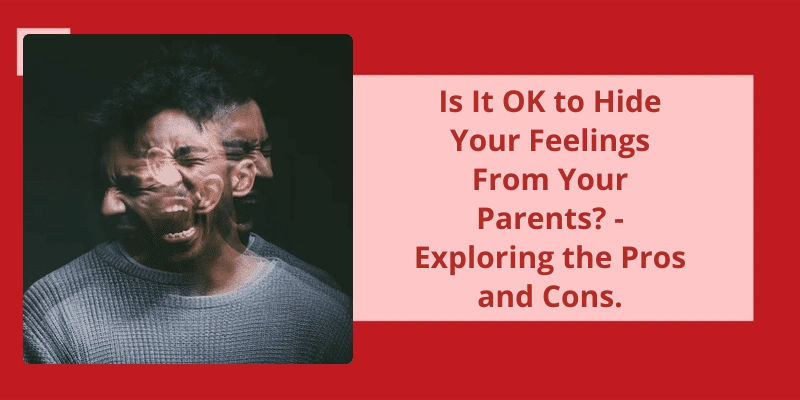As we grow up, we start to form our own opinions and perspectives about the world around us. This includes our personal relationships and the people that we choose to surround ourselves with. While it may be difficult to keep things from those closest to us, such as parents, it's important to remember that we’ve our own boundaries and level of comfort when it comes to sharing personal information. One question that often arises is whether it's okay to hide our feelings from our parents, particularly when it comes to romantic relationships. It's important to know that there's no one-size-fits-all answer to this question, as everyone's situation is different. However, one thing is for certain – it's perfectly fine to wait until we're comfortable sharing our thoughts and feelings with our parents. Sometimes, it's necessary for our mental and emotional well-being to keep certain things private, and that includes our relationships. Ultimately, the decision to reveal our feelings to our parents should be based on what feels right for us individually.
Is It Normal to Hide Your Feelings From Your Parents?
Children who express excitement, joy, or enthusiasm may also be met with dismissive or critical reactions from their parents or others they look up to.
The result of this kind of conditioning is that the child learns to keep their emotions to themselves and may struggle to form close, intimate relationships later in life. They may also become disconnected from themselves and their own needs, leading to mental health challenges like anxiety and depression.
However, even if a child grows up in an environment where their emotions are validated and accepted, it’s not uncommon for them to hide their feelings from their parents. Adolescence is a time of intense emotional upheaval, as teens navigate shifting social hierarchies, hormonal changes, and increasing pressure to establish their identity.
During this time, it’s natural to want privacy and space to figure things out for oneself. Teenagers may worry that their parents won’t understand or accept their feelings, or that they’ll be judged for their choices. In some cases, they may simply lack the words to express themselves effectively.
It’s important for parents and caregivers to create an environment where children feel safe and supported to express themselves authentically, without fear of judgment or rejection. This can take time, especially if the parenting styles of previous generations emphasized control, obedience, and conformity over individual expression and autonomy.
Parents can also model healthy emotional expression themselves, making space for their own feelings and honoring the feelings of others. This can involve practicing active listening, using “I” statements instead of “you” statements, and showing empathy and understanding when someone shares their feelings.
Ultimately, hiding ones feelings from others can be a form of self-protection, but it can also lead to feelings of isolation and disconnection. By creating a safe and supportive environment for emotional expression, parents can help their children develop positive mental health practices that will benefit them throughout their lives.
Navigating a strained relationship with your parents can be a difficult and emotional process. It’s not uncommon for individuals to struggle with negative feelings towards their parents, and it’s important to remember that these feelings are valid. If you’re trying to determine how to proceed with your relationship, there are a few tips to keep in mind. The first step is to decide whether you want to try to salvage the relationship or if it’s time to cut ties with toxic parents. Here are a few things to consider as you make your decision.
Is It Okay to Not Feel Love for Your Parents?
The idea of not feeling love towards your parents can be difficult to process, especially since it’s often associated with feelings of guilt and shame. However, it’s important to recognize that not everyone has positive relationships with their parents, and this is a normal experience. In fact, it’s common for individuals to harbor negative emotions towards their family members, whether it be due to past traumas or ongoing issues.
If you find yourself in this situation, the first step is to acknowledge and accept your feelings. It’s perfectly valid to feel resentful, angry, or apathetic towards your parents, and you shouldnt feel pressured to pretend otherwise. However, it’s important to understand that these emotions may not always be permanent, and that you’ve the power to change the nature of your relationship with your parents.
Before deciding on your next move, it may be helpful to reflect on your reasons for feeling the way you do. Are there specific events or behaviors that have caused your negative emotions? Are there underlying issues that have yet to be addressed? By understanding the root of your feelings, you may be able to pinpoint ways to address them and potentially improve your relationship with your parents.
If you decide that you want to salvage your relationships, it’s important to approach the situation with empathy and open communication. This may require setting boundaries, expressing your emotions in a constructive way, and being willing to listen to your parents perspectives. Remember that healing takes time, and that progress may not be linear.
On the other hand, if you determine that it’s best to cut contact with your toxic parents, it’s important to prioritize your own mental health and wellbeing. This may mean seeking support from friends, family, or a therapist, and creating a plan for moving forward without your parents in your life. It can be a difficult decision to make, but ultimately, your own emotional and physical safety should be the top priority.
In summary, whether you feel love towards your parents or not is a common experience, and one that requires careful consideration and reflection. By acknowledging your emotions and understanding the root of them, you can make an informed decision about whether to salvage your relationships or cut ties. Ultimately, it’s important to prioritize your own well-being and do what’s best for you.
Source: Is it normal to not like or love your parents?..
It’s natural to have complicated feelings towards your parents. While they’ve been a part of your life since birth, it’s important to recognize that you’re your own person with your own thoughts and emotions. While you may not always agree with your parents, it’s important to maintain a level of respect and civility in your relationship with them. After all, they’ve likely played an important role in shaping the person you’re today.
Am I Obligated to Like My Parents?
It’s natural to have disagreements and conflicts within any family dynamic, but it’s important to address these issues in a healthy manner. If there are underlying issues that are causing significant tension, it may be beneficial to seek counseling or therapy to work through those issues.
However, there may be situations in which it isn’t possible or safe to maintain a relationship with a parent. In cases of abuse, neglect, or toxicity, it may be necessary to create boundaries or cut ties with a parent for your own mental and emotional well-being.
It’s also important to consider the cultural and societal expectations around parent-child relationships. Some cultures may place a heavy emphasis on respecting and honoring parents, which can make it difficult for individuals to express negative feelings or set boundaries. It’s important to remember that your mental health and well-being should always come first, regardless of cultural or familial expectations.
Ultimately, the decision to maintain a relationship with your parents is a personal one. It may be beneficial to seek advice and support from trusted friends or professionals as you navigate these complex emotions and dynamics.
In summary, while love and respect are important components of a healthy parent-child relationship, individuals aren’t obligated to like or maintain a relationship with their parents. It’s important to prioritize your own mental and emotional well-being, and seek support and guidance as needed.
It’s not uncommon for children to keep their emotions and thoughts hidden from their parents. Sometimes, it’s due to the parents’ behavior, and other times it may just be the child’s personality. In this article, we will explore the reasons behind why children might hide their feelings from their parents and what parents can do to encourage their child to open up.
Why Do Children Hide Their Feelings From Their Parents?
Children have the tendency to hide their feelings from their parents for a multitude of reasons. One of the primary reasons is the fear of judgement or criticism. Children may feel like their parents will be disappointed in them or will react in a negative way if they share their honest feelings. This can be particularly true if the child feels like their parents have high expectations or are very strict.
Children who’ve experienced betrayal or disappointment from their parents in the past may not be willing to share their true emotions with them in the future. This could be due to a parent breaking a promise or not being supportive in a time of need. If a child feels like they can’t trust their parents with their feelings, they may be less likely to open up to them.
In addition, children may hide their feelings to maintain their sense of autonomy. As children grow older, they naturally begin to assert their independence and make their own decisions. If a parent is too overbearing or constantly prying into their childs personal life, the child may feel like they’ve to hide things to maintain their independence.
This can be especially problematic if the child is experiencing intense emotions like depression or anxiety, as it can be difficult for them to seek help or support from their parents.
The Long-Term Effects of Children Hiding Their Emotions and How It Can Impact Their Mental Health and Relationships in the Future
Children who suppress or hide their emotions may face long-term negative effects on their mental health and relationships. Keeping emotions bottled up can lead to anxiety, depression, and difficulty in forming meaningful connections with others. Such children may struggle with regulating their emotions and may become emotionally distant or detached. The ability to communicate feelings is an important skill that should be encouraged in children to promote positive mental health and healthy relationships in the future.
As teenagers grow older, they start to explore their individuality and experiment with new experiences. With this comes a desire for privacy and independence, which is completely normal. However, some parents may not understand this need, and may be overly controlling or demanding. As a result, many teens may wonder if it’s possible to keep certain things hidden from their parents. But is it wrong to do so? Let’s explore this further.
Can I Hide Things From My Parents?
As a teenager, it’s perfectly normal to want some privacy from your parents. It’s a natural part of growing up and becoming more independent. Having privacy is crucial for good mental health, as it establishes a sense of individualism and self-reliance. Some parents may not realize the importance of giving their children some space, but it isn’t wrong to want to hide things from them.
It’s important to note that the desire for privacy doesn’t equate to hiding something wrong or illegal from your parents. It simply means that you want to keep certain aspects of your life to yourself. However, if you’re hiding something that’s harmful or illegal, it’s important to seek help and guidance from a trusted adult or authority figure.
Some parents can be overbearing and strict, making it difficult for their children to express themselves freely. This isn’t something that you can control, and it isn’t your fault. Feeling suffocated by your parents expectations is a natural response, and it’s important to find healthy ways to cope with this pressure.
Ultimately, no one is entitled to know every detail of your private life, not even your parents. It’s healthy to set boundaries and establish a level of privacy in your relationships, including with family. Communication is key in any relationship, and it’s important to have open and honest conversations with your parents about your need for privacy.
Remember, hiding things from your parents isn’t inherently wrong. However, it’s important to do so in a respectful and safe manner. If you’re feeling overwhelmed or scared, don’t hesitate to seek help from a trusted adult or authority figure. Your mental and emotional health should always come first.
Balancing Privacy With Accountability and Responsibility in Relationships With Parents
- Establish clear boundaries with your parents and communicate them effectively
- Discuss the importance of privacy and trust in your relationship
- Work together to find a balance between privacy and accountability
- Consider seeking outside help or mediation if necessary
- Respect each other’s perspectives and feelings
- Regularly check in with each other and reassess the situation as needed
Conclusion
In conclusion, the decision to share your innermost thoughts and emotions with your parents is a highly personal one that depends entirely upon your individual situation and level of comfort. While it's important to maintain open lines of communication with your family, there’s no rule that states you must share everything with them immediately or at all. Ultimately, you’ve the right to decide what you do or don’t disclose to your parents based on your own needs and desires. By taking the time to understand your own feelings and preferences, you can build greater trust and confidence in yourself and make more informed decisions about when and how to share your innermost self with others.






